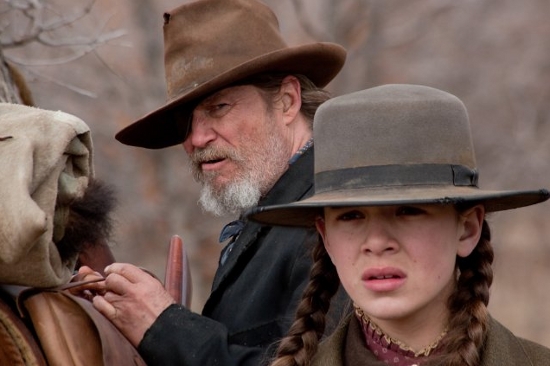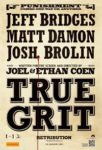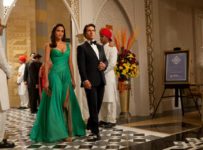Following the murder and robbery of her father at the hands of ranch-hand, practical and precocious 14-year-old Mattie Ross (newcomer Hailee Steinfeld) vows that she will avenge his death. The local sheriff turns a blind eye to the dealing, and the murderer Tom Cheney (Josh Brolin, Wall Street: Money Never Sleeps) is on the run with his outlaw gang (led by Barry Pepper, The Three Burials Of Melquiades Estrada). Mattie takes matters into her own hands, turning to Deputy U.S. Marshal Reuben J. “Rooster” Cogburn (Jeff Bridges, TRON: Legacy) based on his take-no-prisoners reputation, despite advice and her own inclination to the contrary. Cogburn is equally dismissive of the girl, but takes the job due to Mattie’s persistence. Texas Ranger La Boeuf (Matt Damon, Invictus) also seeks to track down the ill-doer, and this only steels Mattie’s resolve to bring the outlaw to justice.
Despite apprehensions that viewers may have about the Coen Brothers stepping into remake territory again, especially after the misguided The Ladykillers (2004), it bears stating up front that this is the greatest Coen Brothers creation to date. It seems as though the Coen Brothers have been making westerns for years, such is their skill on True Grit, but with the exception of a modern take on the genre in 2007’s No Country for Old Men, this is the first time the brothers have strapped on the spurs and stepped outside the comfort of our contemporary times. For all of the angst that purists may have over these fine artists taking cinephiles’ beloved 1969 Henry Hathaway film and making a bloody mockery of it, rest assured: your original wasn’t that good. With the exception of an Golden Globe-winning performance from a bloated and aging John Wayne, a self-parody if ever there was one, his swansong performance remains one of the few legacies of that overlong relic of the late 1960s, a time when films such as Once Upon a Time in the West and The Wild Bunch were challenging traditional notions of western heroism. Instead, the Coens have a far tougher legacy to live up to: that of the original 1968 novel by Charles Portis, and the century of western filmmaking that has informed the popular psyche’s notion of gunslingers.
For a text written in the late 1960s, there is a formal rhythm to the language that borders on the evangelical. As with the novel, the film opens with the same calm voice-over of the adult Mattie: “People do not give it credence that a young girl could leave home and go off in the wintertime to avenge her father’s blood, but it did happen”. As Donna Tartt notes in her introduction to the 2004 Bloomsbury reprint, this sets up the premise of the story both “elegantly and economically”. Yet in the eloquent simplicity of Portis’ – and by extension the Coens’ – exposition, there belies a complex interplay between the forces of life and death that has hitherto been unseen on screen. Death is violent, it is bloody, it is cold and typically unforgiving. Yet in death, and in killing, there is also redemption and something close to enlightenment. There is also a large dose of dark humour in death, and it will come as no surprise to followers of the Coen Brothers that they play with this as well. After Mattie urges him to bury some toughs he has recently dispatched in the cold winter ground, Cogburn quips “Them men wanted a decent burial, they should have got themselves killed in the summer”.
Unsurprisingly, the casting is impeccable. Completely erasing visions of John Wayne parodies (complete with requisite “Pilgrims!”) from the back of our minds, Jeff Bridges simultaneously shifts his own image away from that of The Dude, a role he has been indelibly linked with since the Coens’ 1998 cult film, The Big Lebowski (and seemingly reprised in last year’s TRON: Legacy). Even though the character “loves to pull the cork”, as one sheriff delicately puts it, Bridges adds real weight to a character that often doesn’t seem to know whether he is coming or going, but is able to turn deadly serious on a dime.
Meanwhile Damon, delivering some of the most flowery dialogue from the novel that the brothers have thankfully kept in tact (“You give me very little sugar with your pronouncements”), treads an accomplished fine line with his portrayal of the vain and rigid Texas Ranger. He threatens to topple into parody, but to Damon’s credit, he manages to stay the right side of engaging to the bitter end. Yet it is newcomer Hailee Steinfeld as Mattie who holds together the two extreme men and provides the solid emotional core at the heart of the story. Rather than being a precocious young thing, the actress (only 13 at the time of filming) delivers an emotional honesty and self-assured directness that actors twice her age are often unable to provide.
The Coen Brothers bring to bear all their skills and talents in what is not only be the best western in recent memory, but one of the finest examples of traditional western (or any other kind of) filmmaking in over a hundred years. Deliberately tipping its Stetson to not just the original novel and film, but to all saddle sagas that have graced the screen, if True Grit does spark a revival of the gunslinging genre, it will be a tough act to follow for some time to come.
True Grit surpasses not only all other films in the genre over the last few decades, but distinguishes itself as one of the Coens’ finest films to date. Superbly acted and tautly paced, it is one of the few occasions where you will want to spend more time with the cleverly crafted characters.
True Grit is released by Paramount Pictures in Australia on January 26, 2011.







No Responses